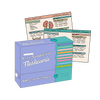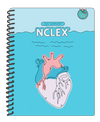Be a Detective & Decipher What the Question is Actually Asking
Half of the NCLEX is figuring out what each question is truly asking. Think of each question as a prompt, which means they require you to read and take a moment to think about what it’s actually asking. Is it simply asking you to identify an abnormal value? Is it asking for you to prioritize a patient over another? Or is it asking for an action? Here, I break things down for you. When you see these key terms, they should spark a little light within your brain to lead you into a certain pathway of thought.
Priority Questions:
“What is the priority assessment?”
“What is the priority action?”
“What should the nurse do first?”
“Which patient should the nurse assess first?”
These statements are asking you to make a vital decision. More often than not, you’ll be choosing an action answer based on your knowledge of the ABCs (airway, breathing, circulation).
Tips for answering these questions:
- Pain is rarely the answer (it is not life-threatening)
- Neurological changes are hidden dangers (signs of increased ICP, spinal cord injury, meningitis) may be the answer!
- Think of your ABCs
- Airway (compromised airway, inability to handle secretions/drooling, gasping, stridor)
- Breathing (rapidly decreasing oxygen saturation, high-pitched wheezing)
- Circulation (Cyanosis, cardiac arrhythmias, chest pain)
“Incorrect” Answers (Pssst… this means the “correct” exam answer is an incorrect statement!):
“What statement would require further teaching by the nurse?”
“Which of the following would require intervention by the nurse?”
“Which of the following is an incorrect statement regarding…”
These can get confusing. You might think “well, I’m choosing the RIGHT answer, but I’m actually identifying the WRONG information. Exactly! For these questions, be on the lookout for incorrect information or a wrong piece of information. It’s helpful to go one option at a time. Ask yourself, “is this information correct or incorrect?” There will only be ONE incorrect statement, and that will be your choice!
Intervention Questions:
What statement would require intervention?
What should the nurse do next?
When should the nurse contact the HCP?
Which of the following lab values would cause concern?
Which of the following patients requires a higher level of care?
These typically are giving you the hint to ACT. Here, look for:
- Abnormal lab values
- Concerning signs or symptoms
- Changes in status
- Option to assess further or perform a focused assessment
- Option to gather more information (vital signs, etc.)
The NCLEX can be tricky, so know that not every single question requires an action! Sometimes, your action is to simply monitor and continue routine assessments. Not every single question requires an ACTION, CHANGE or INTERVENTION! This is why it’s so important to know the expected vs. unexpected and how to proceed.
How do I study these and learn more about answering them?
My #1 answer will ALWAYS be practice questions. It’ll give you great insight about how the questions are written, worded, and what they’re trying to make you understand. The more you speak the language of the NCLEX, practice it, read it, and look at their rationales, the more you’ll be able to fluently learn that language and find hints in all your questions.
You got this future nurse!
<3 Kristine














